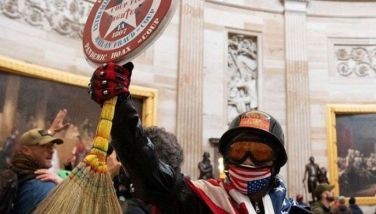Debt limit overtaking shutdown as US crisis focus
WASHINGTON — A possible national default loomed closer on Monday as the partial federal government shutdown continued, rattling markets in the U.S. and overseas. A gridlocked Congress betrayed little or no urgency toward resolving either of the threats.
The shutdown centers on a fight over funding for President Barack Obama's new health care law. Economists say the default that could follow might trigger a financial crisis and recession that would echo the 2008 financial crisis, which plunged the country into the worst recession since the Great Depression of the 1930s.
Stocks got a case of the jitters on Wall Street, and halfway around the world China stressed the importance for the international economy of raising the U.S. debt limit.
"Safeguarding the debt is of vital importance to the economy of the U.S. and the world," Vice Finance Minister Zhu Guangyao said, according to the official Xinhua News Agency. China holds $1.277 trillion in U.S. Treasury bonds, second only to Japan.
President Barack Obama said the House should vote immediately on ending the partial closure of the federal establishment. He accused Republican House Speaker John Boehner of refusing to permit the necessary legislation to come to the floor because he "doesn't apparently want to see the ... shutdown end at the moment, unless he's able to extract concessions that don't have anything to do with the budget."
Boehner, in rebuttal, called on Obama to agree to negotiations on changes in the nation's health care overhaul and steps to curb deficits, the principal Republican demands for ending the shutdown and eliminating the threat of default.
"Really, Mr. President. It's time to have that conversation before our economy is put further at risk," he said in remarks on the House floor.
Obama said he would talk with the Republicans on those topics or virtually any others. But the White House has said repeatedly the president will not negotiate until the government is fully re-opened and the debt limit has been raised to stave off the nation's first-ever default.
Meanwhile, the shutdown began to ease over the weekend, when about 350,000 civilian defense workers were recalled as the result of legislation Congress passed and Obama signed after the shutdown began.
That left an estimated 450,000 federal employees idle at agencies responsible for domestic programs, ranging from the Departments of Education to Energy, and including Labor, Health and Human Services, Interior, Transportation and more.
The shutdown has been felt unevenly, however, because of complex rules and the ability of senior officials to declare some projects essential and therefore allowed to remain open.
Some routine food checks by the FDA were suspended, but the Department of Agriculture's meat inspections continued uninterrupted. Much of the nation's space agency was shuttered, although work continued on plans to launch a robotic probe to Mars, which has a once-every-two-years launch window.
Top defense officials noted that despite the recall of most civilians, and the resumption of many activities across the Defense Department, there are critical programs and benefits that remain halted, according to a Pentagon report on their meeting with Defense Secretary Chuck Hagel.
The current standoff is the latest in a string of clashes over the past three years between Obama and a House Republican majority that has steered to the right with the rise of the conservative, anti-tax tea party.
Private economists generally agree that a default on the U.S. debt would be extremely harmful, especially if the impasse was not resolved quickly.
Separately, a White House aide said Obama would be receptive to an interim, short-term measure to prevent default.
Lew has said that while Treasury expects to have $30 billion of cash on hand on Oct. 17, that money would be quickly exhausted in paying incoming bills given that the government's payments can run up to $60 billion on a single day.
Most Democrats and many Republicans have assumed the Republicans will pay a heavier price for a shutdown than the Democrats, since that was the case in 1996.
And a survey released by the Washington Post-ABC said disapproval of Republicans was measured at 70 percent, up from 63 percent a week earlier. Disapproval of Obama's role was statistically unchanged at 51 percent.
- Latest
- Trending

































